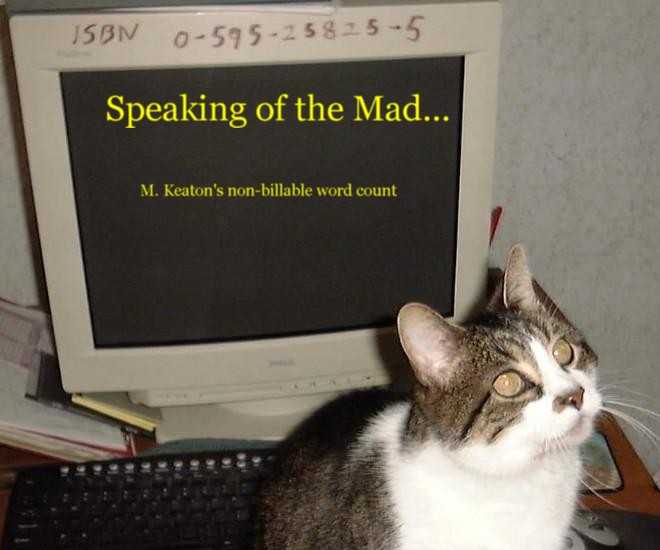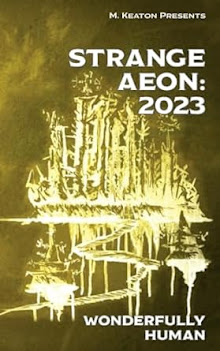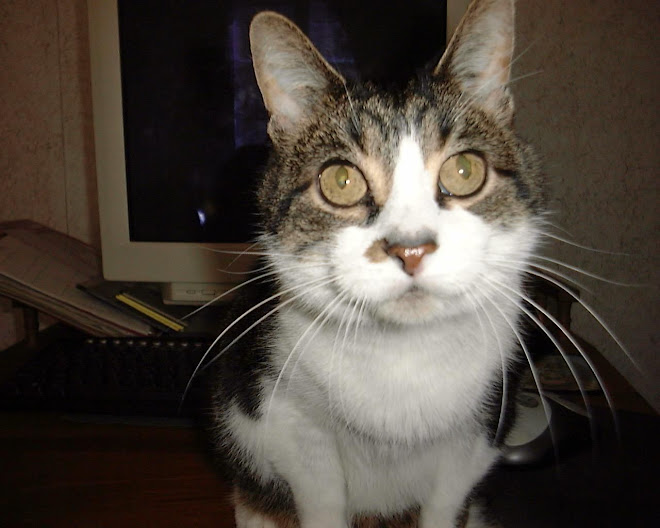I’m doing most of my writing now from my laptop, which is annoying because the keyboard is so small. Now, I’m not on a netbook or any tiny toy like that, I’m on a normal laptop with a “full-sized” keyboard. Problem is, it’s a “full-sized” computer keyboard and it’s flat and jammed together.
I’m old. I know it, I’m happy with it, I embrace my antiquity. It just causes small problems on occasion. For example: People looking over at me in the library and saying “Dude, what’re you trying to kill it?” I learned to type during a different time, the age of typewriters (during the “fire good, wheel patent-pending” era for you youngsters). Back then, we had keys that were actual keys and you’d better slap ‘em hard if you wanted a clear result. We had manual typewriters and, I must explain for the children, a manual typewriter is basically a set of levers with woodcuts of letter on one end and you smash down the other. The woodcut flies up (hopefully) to smack on the back of a ribbon (the fancy technical term for “piece of cloth soaked in ink-usually in two colors just to be helpful). Imagine your wife’s scrap booking stamping kit but made of metal for use by men.
It was a different era, a golden time when we were taught to strike hard and to actually spread our fingers out because the keys had to be far enough away from each other to avoid tangling up as you went. It was a time when accuracy was more important than speed because mistakes were fatal. Well, not directly fatal but indirectly because the stress and extra work of trying to fix a typographical error in those days would lead a man to an early grave. There was no “file”, no electronic copy. There was the sheet of paper in the machine and the fourteen carbons behind it and you had to hit hard enough to carry the ink through them all. In theory there were a dozen different ways to fix errors, from poisonous paint to cover your error to little sheet covered in carcinogens that you could retype over. But none of them fixed the carbons—you had to do that one at a time—and they all came with their own complicated ways to mess things up even worse. No, there was only one true way to fix a problem: rip the paper out of the machine, crumple it up in a ball, throw it over your shoulder, and start again. A successful author was judged based on how many wads of paper surrounded his chair. We didn’t have word count, publishers ordered manuscripts by the pound. At the end of a hard day, you’d have to shove through the waist-high debris to get to the door. Most of us just slept at our desks until our publishers sent someone over with dig us out and get the finished manuscript. The original Hugo trophy was a snow shovel!
We went through the paper in those days, ten or twelve sheets tossed to the floor for every page of clean manuscript copy. And there was no email or electronic submissions, everything had to be done by hand—reams of paper sent to the far edges of the earth to be inspected by monastic orders who lived in the mountains of Tibet and read slush. More than a handful of rejections for a book and you’d have to become a best-seller just to cover the investment in postage.
It was no time for the weak. With no fancy interweb, we did our research the hard way; we lived it. We learned police procedure by starting bar fights and spending a night in the tank. Sure, we did ride-alongs with the cops—from the back seat. Want to understand military strategy? Saddle up and ride with Teddy off to find a war. We were hard men in hard time in a hard job. Hemmingway used to eat other authors just to keep his strength up!
It was a time when authors were respected. Well, no, but we were feared! Today, tell someone that you’re an author and they nod. “That’s nice. My cousin wrote a cookbook and…” (I’ve never heard the end of that sentence; I don’t have the attention span.) In the golden days, say you were an author and men gasped, mothers pulled their children in off the streets, and neighborhood petitions were passed urging the city fathers to pay you to leave town. We were paid in paper, ink, and whiskey. We ate what we could catch—leaves, tree bark, slow neighborhood dogs. Children would disappear only to be found days later by desperate relatives; wandering like miniature Dr. Zhivago’s, the tops of their heads barely visible above the great blowing drifts of wadded paper filling the house. Where authors went, bad things followed.
Fire was the worst. Working neck deep in dry paper, sweating alcohol, and smoking like a chimney fires were common. More than a few of the best authors of the past were victims of spontaneous combustion. Our only defense was coffee. In those days, coffee only came in two flavors: solid and sludge depending on how long the pot had been sitting on the radiator. We didn’t have fancy frapees or mocawhatsits or special mild blends of roasted beans; we had a black gruel of battery acid, cigarette ashes, and burnt bread crumbs dumped out of the toaster. With enough coffee, a man could become fireproof, like old leather or half-petrified wood.
It hurt, a good hurt, the kind of hurt that tells a man he’s alive and that death will only come as a favor we’re not good enough to earn. We had lungs full of smoke, blood full of alcohol, heads and hearts burning with passion for the craft, and terminal heartburn in our guts.
That’s the problem with kids today; no fire in their bellies.
Tuesday, January 12, 2010
Update
I said we might be off the air for a while. I underestimated “a while”. Without going into too much boring detail: still homeless and living out of a travel trailer, freezing, and working off the laptop. I’d be lying if I didn’t say it was horribly frustrating at best and it’s even harder to work, especially since I spend a good portion of my day making sure the water doesn’t freeze and/or thawing out frozen pipes. So, the more promising news:
Book Signing:
Hastings in Springdale AR
January 30
1-4pm.
And I’ve been invited back to MidSouth Con.
Oh, and we have a new kitten but I’m inclined to file that under “bad things”.
Book Signing:
Hastings in Springdale AR
January 30
1-4pm.
And I’ve been invited back to MidSouth Con.
Oh, and we have a new kitten but I’m inclined to file that under “bad things”.
Subscribe to:
Comments (Atom)




















